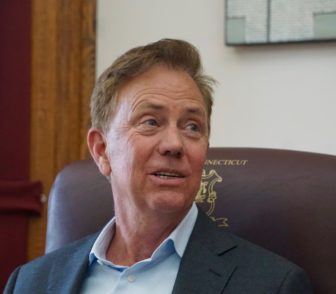Lamont’s Family Fight with Dems over Borrowing Priorities

Audio By Carbonatix

Gov. Ned Lamont. Photo credit: Mark Pazniokas, CTMirror.org
Governor wants money for infrastructure before financing ‘political pork.’
By Keith M. Phaneuf and Mark Pazniokas, CTMirror.org
A power play is unfolding over control of state borrowing, pitting Gov. Ned Lamont and his insistence on prioritizing spending for transportation infrastructure against the prerogatives of lawmakers and their desire to deliver on local priorities, among other things.
After sparring with legislators for much of the summer, the Lamont administration is sending lawmakers a clear message: Until lawmakers settle on even a short-term plan upgrading Connecticut’s aging infrastructure, other projects will have to wait.
So far, the fight is intra-party, a contest of wills between a Democratic governor still relatively new to the Capitol and leaders of the Democratic majorities in the General Assembly, where bonding for local projects long has been a lubricant in the legislative process. One prominent Republican is backing the governor’s play.
Senate Minority Leader Len Fasano, R-North Haven, has frequently criticized Lamont, but he says Senate Republicans would stand with the governor in upholding a veto of a bond package deemed wasteful or ill-focused. At the same time, Fasano questions whether Lamont has the will for the fight, calling him “weak-kneed.”
Ryan Drajewicz, the governor’s chief of staff, said the governor is standing firm on limiting borrowing for a priority list that includes transportation.
“Just as many Connecticut families do, the state must also live within its means and make prioritized trade offs when facing budget constraints,” Drajewicz told CT Mirror. “The ‘Must-dos’ take precedent over the ‘Nice-to-haves.’ The governor is of the strong opinion that modernizing and upgrading the state’s transportation systems is a ‘Must-do’ and essential to the state’s economic growth, providing a higher return for all of the 3.5 million residents of this great state.”
Lamont and lawmakers settled in June on a new two-year budget that met the governor’s goal of not raising income-tax rates.
But the biennial budget also is complemented by a two-year bonding plan that outlines billions of dollars in financing for municipal school construction, transportation work, state building maintenance, economic development initiatives, clean water projects – and a host of smaller, community-based projects sought by legislators for their home districts.
That last category, often dubbed “pork-barrel spending” by critics, typically is focused on the majority party’s districts and is considered vital to legislators seeking re-election. But Lamont, who took office in January, insists Connecticut’s borrowing is out of hand and wants state government to go on a “debt diet.”
The governor recommended that legislators authorize no more than $1 billion per year in general obligation, or G.O., bonding, two-thirds of what it issued on average between 2012 and 2019. G.O. bonds are repaid with income tax receipts and other revenues from the budget’s general fund.
“Connecticut is one of the nation’s leaders in per-capita state debt, in part because the state puts too much on its credit card, and that debt service costs real money, with real implications on the General Fund,” Drajewicz said.
But the governor also says Connecticut needs to invest more in its highways, bridges and rail system, and the session ended with him unable to convince lawmakers to tap a major new source of revenue – electronic tolling on the Merritt Parkway and Interstates 84, 91 and 95. The administration says tolls could raise about $800 million annually by 2024 or 2025.
In the short term, Lamont asked them to pump an extra $100 million in state borrowing into transportation infrastructure. As a compromise offer, the governor said he would consider as much as as $1.3 billion per year in G.O. bonding – provided legislators would agree to dedicate $100 million of that extra $300 million for state transportation projects.
Democratic legislative leaders have countered that they need $1.3 billion per year in G.O. bonds to meet all of their non-transportation needs. If Lamont wants an extra $100 million for transportation infrastructure, they said, then the G.O. bonding total needs to climb to $1.4 billion.
Lamont hasn’t budged from his compromise offer, however.
“I can understand the governor looking to use the bonding issue as leverage,” said Senate President Pro Tem Martin M. Looney, D-New Haven. “That’s something that governing chief executives do to achieve some policy purpose.”
But Looney said there are many groups that will be hurt if the disagreement lasts too long.
Cities and towns already have complained that the first half of a $60 million road repaving grant traditionally delivered in July still hasn’t gone out. That’s because the Town Aid Road grant is funded with money borrowed through bonding, and there’s no agreement on a bond package.
Many of the community-based projects for which legislators seek bonding are to support private, nonprofit social service groups that work with the disabled and the mentally ill. These bond dollars fund capital repairs the nonprofits otherwise could not afford, Looney said.
“These nonprofits are operating on a shoestring budget,” he said.
House Speaker Joe Aresimowicz, D-Berlin, said lawmakers are aware of Connecticut’s debt burden and have tried to balance that against the many needs across the state.
“Governor Lamont feels strongly we should have more bonding for transportation infrastructure improvements, and I share that sentiment,” he said. “But we can’t hold up everything.”
Drajewicz countered that the administration understands many of these projects in legislators’ districts have value.
“Projects for individual communities are vital to maintaining the accessibility and the character of the state’s small towns and urban centers, and they are what help make Connecticut such a wonderful place to live with a high quality of life,” he said. “But those investments only go so far when it takes residents hours to reach those places, either sitting in traffic, waiting for repairs on an aging bridge, or sitting on a slow or delayed rail car or bus.”
Sen. John Fonfara, D-Hartford, co-chairman of the Finance, Revenue and Bonding Committee, introduced a bill last spring to wrest control of the bonding process away from the governor and place it entirely in the legislature’s hands, a major shift in political power at at the Capitol.
The bill cleared the finance committee but leaders opted not to call it in the House or Senate.
Fonfara said he still believes the legislature should have more control over borrowing, adding that the many projects it supports represent a crucial tool for economic development.
“It is inaccurate and unfortunate that we have reduced the role of legislators and the importance of the projects that they bring to splash pads” and other recreation-centered initiatives, he said. “Splash pads are important for young kids in some cities who don’t have the opportunity to go to the beach for a weekend and stay in a cottage in Old Saybrook. But many of these projects are job-creators and generators of local property tax revenue.”
State bonding routinely is used to support downtown revitalization programs and brownfield remediation.
The Lamont administration hasn’t said legislators must embrace tolls to resolve the bonding debate.
And while minority Republicans have been unified in their opposition to tolls, Fasano said the GOP shares common ground with the governor in this latest battle.
More specifically, Fasano said, Republicans want to see more state borrowing dedicated to transportation and less for other programs. The GOP’s alternative to tolls, an initiative they dubbed “Prioritize Progress,” essentially is a long-term plan to shift borrowing along these lines.
“When given the opportunity to bond at historic levels during the last administration, the Democratic majority didn’t blink once,” Fasano said, referring to former Gov. Dannel P. Malloy. “I’m going to hold Governor Lamont to his debt diet. This governor is weak-kneed and he’s got to stand firm.”
And should Democratic legislators adopt a larger bond package, triggering a Lamont veto, Fasano said the Democratic governor likely would find allies among the GOP. Democrats have solid majorities, but they would need Republican support to override a veto.
“If he vetoes it, we’ll support his veto,” Fasano said. “We don’t want to bond excessively either.”
Reprinted with permission of The Connecticut Mirror. The authors can be reached at [email protected] and [email protected] .
Like what you see here? Click here to subscribe to We-Ha’s newsletter so you’ll always be in the know about what’s happening in West Hartford!



